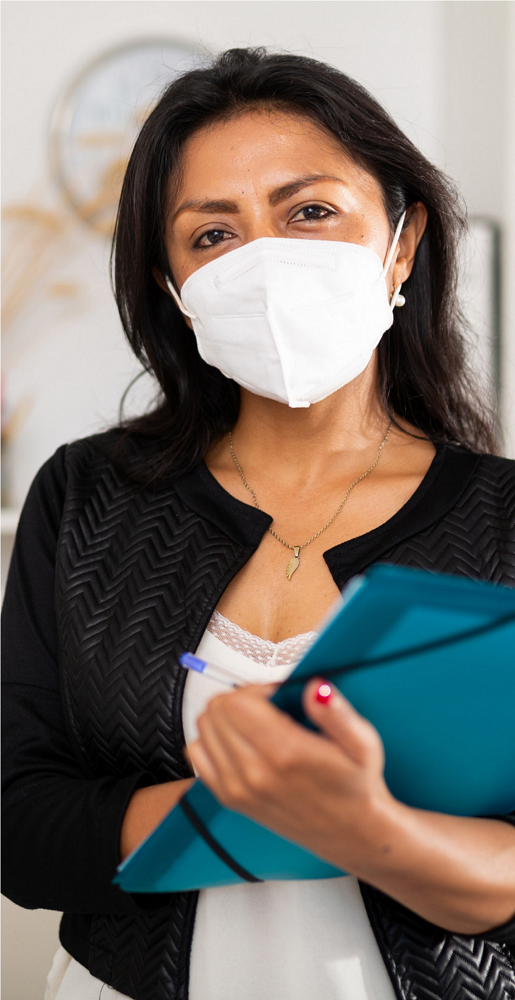Talking Points for Community Health Workers
This resource has been archived.
Important note: This content is no longer current and is archived here for reference only.
It should not be downloaded and shared.
Community health workers are valuable sources of comfort and support for their communities during times of distress. You have the ability to speak on concerns, fears, and anxieties regarding COVID
Suggestion: Reiterate the importance of essential workers for their families and communities. They need to stay healthy because they provide for their families and fulfill a crucial role in their communities. If they get COVID-19, they will have to stop working.
Vaccine readiness/confidence

Safety
- The vaccines are safe.
- The vaccines can’t give you COVID-19.
- Hundreds of millions of people in the United States have safely received COVID-19 vaccines under the most intense safety monitoring in U.S. history.
- Providers can give patients COVID-19 vaccines at the same time as other vaccines, such as the flu vaccine.
Effectiveness
All available COVID-19 vaccines are highly effective at preventing severe illness, hospitalization, and death due to COVID-19.
To get the most protection, you need to stay up to date with your COVID vaccine.
Updated vaccines are available to help protect against Omicron.
Get an updated COVID vaccine now if you’re 18 or older and:
- You haven’t yet gotten a COVID vaccine.
- You’re vaccinated and your last dose was before September 2022.
People 65 and older can now get a second updated COVID vaccine beginning 4 months after their first.
People with a weakened immune system can get a second updated COVID vaccine beginning 2 months after their first. You can get more doses after that if your doctor recommends them.
If you recently had COVID, you can wait 3 months from when you got sick to get your updated COVID vaccine.
Parents and guardians of children under 18: Talk to your child’s vaccine or health care provider about when they need their updated vaccine.
Emergency approval
The FDA carefully reviewed the study data and authorized or approved the vaccines because the benefits outweigh the risks.
Guaranteed immunity?
- After vaccination, it typically takes a few weeks for the body to build protection against the virus that causes COVID-19.
- It’s important to understand that infection doesn’t necessarily lead to illness. If you’re up to date with your COVID vaccines and the virus manages to enter your body and begins to multiply—that is, infect you—your immune system will be prepared to quickly recognize the virus and will work to keep it from doing real harm. That’s why most people who get infected with COVID-19 despite being vaccinated—so-called breakthrough cases—have no symptoms (asymptomatic) or only mild-to-moderate illness. Nearly everyone in the United States who is getting severely ill, needing hospitalization, and dying from COVID-19 is unvaccinated.
- To maximize protection from highly contagious variants and prevent possibly spreading COVID to others,
both vaccinated and unvaccinated people should wear a well-fitting mask inside public places when the COVID risk to your community is high.
- If you’re at higher risk of getting very sick from COVID, you can also protect yourself by:
- Keeping at least 6 feet away from people who don’t live with you.
- Avoiding crowds and poorly ventilated spaces.
- Washing your hands often with soap and water for at least 20 seconds or using hand sanitizer with at least 60% alcohol if you don’t have soap and water.
- If you get COVID-19, there can be long-term health issues after recovery, which is one of the reasons the vaccine is so important.
- We don’t know if getting COVID-19 will protect you from getting it again or how long that protection lasts.
Side effects
- You may have some side effects, which are normal signs that your body is building protection. These side effects may affect your ability to do daily activities, but they should go away in a few days. Some people have no side effects.
- Serious health effects from vaccines are very rare. It’s highly unlikely that COVID-19 vaccines will cause long-term health problems. Also, there is no evidence at all that they will cause infertility or cancer.
- Your risk for serious health problems is much lower from the vaccine than your risk if you’re unvaccinated and get COVID-19. COVID-19 can leave you with heart and lung damage and other conditions that require long-term treatment. Vaccines are much safer paths to immunity than the disease itself.
Availability, cost, and immigration status

- Everyone ages 6 months and older in the United States should get a COVID-19 vaccine. You have three ways to find vaccines near you:
- Go to vaccines.gov
- Text your ZIP code to 438829
- Call 1-800-232-0233
- The vaccines are free of charge to everyone living in the United States, regardless of immigration or health insurance status.
- Receiving the vaccine will not negatively impact your immigration status.
- The U.S. Department of Homeland Security has clarified that vaccines are available to all individuals regardless of immigration status and that enforcement activities won’t be conducted at or near vaccine distribution sites or clinics.
- U.S. Citizenship and Immigration Services has specified that it won’t consider testing, treatment, or preventive care, including vaccines, related to COVID-19 as part of a public charge inadmissibility determination.
